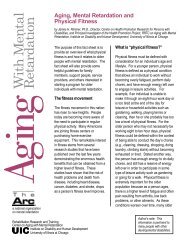Bridging the Aging and Developmental Disabilities Service ... - rrtcadd
Bridging the Aging and Developmental Disabilities Service ... - rrtcadd
Bridging the Aging and Developmental Disabilities Service ... - rrtcadd
You also want an ePaper? Increase the reach of your titles
YUMPU automatically turns print PDFs into web optimized ePapers that Google loves.
Many <strong>Aging</strong> TIPs had a shelf-life of several years, <strong>and</strong> <strong>the</strong>ir leaders formed a national network<br />
that still exists within <strong>the</strong> AUCD’s aging <strong>and</strong> developmental disabilities workgroup. The<br />
eventual demise of some TIPs was <strong>the</strong> result of <strong>the</strong> aging-out of its leaders, changing research<br />
interests, <strong>and</strong> <strong>the</strong> withdrawal of funding by ADD for aging-related initiatives. The latter resulted<br />
in <strong>the</strong> closure or transfer of some aging clinics to generic or specialized health facilities. For<br />
example, <strong>the</strong> Illinois UCEDD’s Cerebral Palsy Clinic moved to <strong>the</strong> Rehabilitation Institute of<br />
Chicago.<br />
However, several UCEDDs funded as <strong>Aging</strong> TIPs continue research <strong>and</strong> training in aging <strong>and</strong><br />
developmental disabilities <strong>and</strong> have branched out in new directions. The Indiana University<br />
UCEDD has ongoing projects in building community supports for older adults with<br />
developmental disabilities through <strong>the</strong> work of gerontologist Phil Stafford. Some <strong>Aging</strong> TIPS<br />
that included a research component have built upon this to develop a larger research portfolio.<br />
The University of Wisconsin’s Waisman Center has exp<strong>and</strong>ed its research on older family<br />
caregivers through o<strong>the</strong>r funding sources. The University of Rochester’s Strong Center is<br />
developing a dataset on adult lifespan health issues <strong>and</strong> continues to conduct staff training on<br />
aging with developmental disabilities. The Illinois UCEDD has been funded as <strong>the</strong> RRTC on<br />
<strong>Aging</strong> with <strong>Developmental</strong> <strong>Disabilities</strong> since 1993 by <strong>the</strong> National Institute on Disability <strong>and</strong><br />
Rehabilitation Research (NIDRR) <strong>and</strong> has subcontracted with <strong>the</strong> UCEDDs in Indiana<br />
Wisconsin, Rochester, Kentucky, Cincinnati, Hawaii, Florida, <strong>and</strong> Minnesota to conduct specific<br />
research projects.<br />
Administration on <strong>Aging</strong> <strong>and</strong> <strong>Developmental</strong> <strong>Disabilities</strong> Discretionary Grants<br />
A search of <strong>the</strong> AoA bibliographic data base to date identified 11 grants that were awarded to<br />
seven states (NY, HI, MO, IL, WI, PA, VA) from 1986 to 1994. 31 The majority of projects<br />
established collaborations between aging <strong>and</strong> DD agencies to integrate older people with<br />
developmental disabilities into community programs, conduct outreach <strong>and</strong> provide supports for<br />
older family caregivers, <strong>and</strong> support older families <strong>and</strong> <strong>the</strong>ir relative with disabilities to make<br />
future plans. The AoA also awarded discretionary grants to two national organizations during<br />
this time period. A grant to The Arc funded coalitions between local Arc agencies <strong>and</strong> o<strong>the</strong>r<br />
community agencies to build community capacity for outreach <strong>and</strong> support to at-risk older<br />
parents caring for adults with developmental disabilities. National Easter Seals was funded to<br />
heighten <strong>the</strong> disability community’s awareness of <strong>the</strong> growing need for services <strong>and</strong> supports<br />
among older persons with disabilities <strong>and</strong> functional limitations <strong>and</strong> developed three models for<br />
assisting at-risk older persons with disabilities. In 2001, AoA funded five demonstration projects<br />
for outreach <strong>and</strong> support to older family caregivers of adults with developmental disabilities in<br />
conjunction with <strong>the</strong> National Family Caregiver Support Program that was established with <strong>the</strong><br />
2000 amendments to <strong>the</strong> Older Americans Act. In 2002, AoA awarded a three-year Alzheimer’s<br />
Disease Demonstration Grant to States to <strong>the</strong> New York State Office on <strong>Aging</strong> to increase <strong>the</strong><br />
ability of persons with developmental disabilities to age in place while <strong>the</strong>ir Alzheimer’s disease<br />
progressed. Descriptions of <strong>the</strong>se grants are in Appendix 5.<br />
AoA recently has partnered with <strong>the</strong> National Institute on <strong>Aging</strong> (NIA) to fund supplements that<br />
will exp<strong>and</strong> <strong>the</strong> focus of four studies of people with long term disabilities who are aging. These<br />
<strong>Bridging</strong> <strong>the</strong> <strong>Aging</strong> <strong>and</strong> <strong>Developmental</strong> <strong>Disabilities</strong> <strong>Service</strong> Networks Page 22



